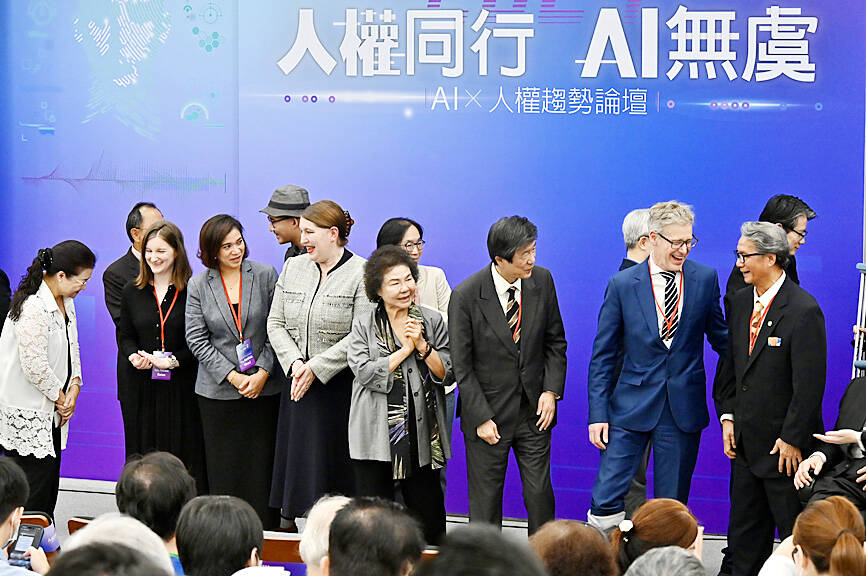Taiwan must be ready for the dangers posed by generative artificial intelligence (AI) to human rights and freedoms, National Human Rights Commission Chairwoman Chen Chu (陳菊) said yesterday.
The commission considers AI-related challenges to human rights a matter of priority, while giving due credit to the convenience and productivity benefits stemming from the technology, she told a conference in Taipei on human rights.
Citing the Office of the UN High Commissioner for Human Rights, Chen said that algorithmic technology has been linked to certain adverse effects on rights and disadvantaged groups.

Photo: George Tsorng, Taipei Times
AI-generated disinformation undermines the foundations of speech freedom by attacking the human capacity to think freely, conceptualize unique ideas and hold freely formed personal beliefs, Chen said.
Disinformation’s spread is especially pernicious to the ability of free people to make considered judgements on public affairs, she said.
AI is also accelerating automation in sectors that traditionally employ disadvantaged groups, worsening poverty and social inequality, Chen said.
Algorithms have extensively been used to generate images harmful to women and children, including materials portraying sexual violence and deepfakes created without the consent of the subjects they depicted, she said.
Children, lacking media literacy to discern bot-generated content, have become more vulnerable to negative influence than before due to AI technology, she said.
Taiwan has to recognize the human rights threat posed by generative AI and take steps to prevent abuses, she said.
She said a recent study conducted by the UN commission showed that 75 percent of respondents revealed personal information while interacting with chatbots and worry that these interactions compromised their privacy.
The survey also showed that 61.7 percent of respondents reported experiencing erroneous, inappropriate or discriminatory content created by an AI tool, she said.
About 90 percent of respondents agreed that more conversations should be included in the development of generative AI to protect the representation of disadvantaged minority groups, she said.
In addition, about 80 percent of respondents agreed that governments should regulate or supervise the research and development of the technology to guard against potential harm to human rights, she said.
As a free and democratic nation, Taiwan must ensure its generative AI technology would respect the values of human dignity and free development of personality, and not be applied in ways that impede freedom, Chen said.

The Chinese military has built landing bridge ships designed to expand its amphibious options for a potential assault on Taiwan, but their combat effectiveness is limited due to their high vulnerability, a defense expert said in an analysis published on Monday. Shen Ming-shih (沈明室), a research fellow at the Institute for National Defense and Security Research, said that the deployment of such vessels as part of the Chinese People’s Liberation Army (PLA) Navy’s East Sea Fleet signals a strong focus on Taiwan. However, the ships are highly vulnerable to precision strikes, which means they could be destroyed before they achieve their intended

About 4.2 million tourist arrivals were recorded in the first half of this year, a 10 percent increase from the same period last year, the Tourism Administration said yesterday. The growth continues to be consistent, with the fourth quarter of this year expected to be the peak in Taiwan, the agency said, adding that it plans to promote Taiwan overseas via partnerships and major events. From January to June, 9.14 million international departures were recorded from Taiwan, an 11 percent increase from the same period last year, with 3.3 million headed for Japan, 1.52 million for China and 832,962 to South Korea,

SOVEREIGNTY: The rigs show that Beijing ‘rejects Taiwan’s jurisdiction’ by building in areas where Taipei demands permission to build or alter installations Chinese oil rigs have been sighted just 26 nautical miles (42km), from Taiwan’s exclusive economic zone (EEZ) near Pratas Island (Dongsha Island, 東沙島), posing a threat to Taiwan’s sovereignty if left unchallenged, a brief published by the Jamestown Foundation on Tuesday said. Pratas Island, 444km from Kaohsiung, is northeast of the South China Sea and houses a Taiwanese garrison. The brief, titled “Rigging the Game: PRC Oil Structures Encroach on Taiwan’s Pratas Island” — referring to the People’s Republic of China — analyzed photographs and said that Beijing’s tools to pressure Taiwan now include oil rigs. “Oil rigs now constitute part of Beijing’s

The Taiwan Experience Education Program (TEEP) has funded short-term internships in Taiwan for more than 4,500 young people from more than 40 countries since 2015, with the goal of attracting and retaining international talent, the Ministry of Education said yesterday. Fifty-five colleges launched 514 projects this year, including in fields such as semiconductors, artificial intelligence, medicine and biotechnology, green energy, and sustainability, it said. The program provides research and practical internships in Taiwan for two to six months, and offers cultural exchange and networking opportunities, the ministry said. For example, National Formosa University’s Embedded System and Autopilot Laboratory developed two solar-powered drones in